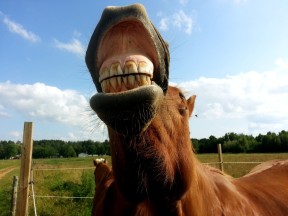Tense Jaw During the Day?
Do you find that your jaw is often tense during the day? Are you clenching, or even grinding your teeth?

We’ve talked about bruxism here before – grinding or clenching your teeth at night, which can lead to headaches. But what about during the day? Many people have what is called “daytime bruxism”. And that tension could trigger headache or migraine attacks.
Now if you know anything about bruxism, you know that many people use a mouth guard while they sleep to help their jaw relax. But who wants to wear a mouth guard during the day?
Well, with a significant portion of the population struggling with this problem during the day, mouth guards are being created that will still allow you to smile and talk normally, without anyone else noticing that you’re wearing it. Like braces, this is a temporary measure that should have long term results.
Sometimes a mouth guard will be given which is similar to its nighttime counterpart, except that it’s especially thin. A recent study in Brazil used a device called DIVA, which is used for 90 days.
The researchers called this a “biofeedback” approach. Biofeedback simply means that you’re retraining some of the normally unconscious things that your body does. In this case, when you start to clench your teeth you can feel the DIVA device, and this gives you a little push to relax your jaw.
The patients in this particular trial suffered from various types of migraine and headache, as well as facial and neck pain. Their symptoms quickly improved, even after the device was removed.
Although devices used for bruxism are by no means a universal migraine cure, many patients have found that a simple, small device has a drastic impact on their migraine symptoms, sometimes completely eliminating them. (One doctor I talked to who had treated many patients with one of these devices found that almost all of them experienced drastic improvement, or eliminated their headache symptoms altogether.)
As the researchers point out:
In addition, the improvement of painful symptoms was temporally related to the reduction of awake bruxism, that is, the improvement of chronic migraine headache was parallel to the improvement of the other pains studied. This suggests that the treatment of awake bruxism may be helpful or even decisive in the treatment of chronic migraine headache when the two clinical conditions are present at the same patient.
[source]
So if you do find that you have morning headache from clenching or grinding, or if you find your jaw tense during the day, talk to your doctor or dentist about daytime bruxism. You may find a simple solution to a lot of your pain.
For more on this particular study, see A new biofeedback approach for the control of awake bruxism and chronic migraine headache: utilization of an awake posterior interocclusal device
